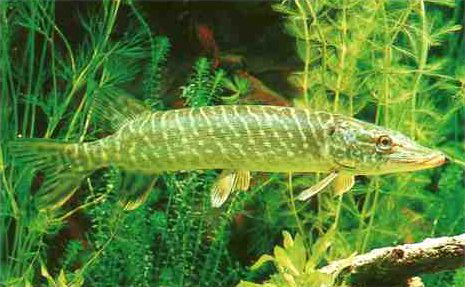Esox
From Wikipedia, the free encyclopedia
Order: Esociformes
Family: Esocidae
Genus: Esox
Species
- Esox americanus ??? grass and redfin pickerels
- Esox lucius ??? northern pike
- Esox masquinongy ??? muskellunge
- Esox niger ??? chain pickerel
- Esox reichertii ??? Amur pike
[Photo] A young Esox lucius specimen???a "pickerel" in the original sense???in an aquarium. Northern pike (Esox lucius). Photo taken by: de:User:MillaTom http://de.wikipedia.org/wiki/Benutzer:MillaTom
Esox (Linnaeus, 1758) is a genus of freshwater fish, a member of the pike family (family Esocidae) of order Esociformes as is the Muskellunge. The type species is Esox lucius, the northern pike. The species of this genus are known as the pikes.
The pike species are native to the Palearctic and Nearctic ecozones, ranging across northern North America and from Western Europe to Siberia in Eurasia. They have been found in many urban lakes in Western Europe, reported to be in the Rostrum, Lucerne and The Serpentine in London.
Pikes can grow to a maximum recorded length of 1.83 metres (6 ft), reaching a maximum recorded weight of 35 kilograms (77 lb). Individuals have been reported to reach 30 years in age. They have the elongated, torpedo-like form of predatory fishes, with sharply-pointed heads and sharp teeth. Their coloration is typically grey-green with a mottled or spotted appearance. The pike's marking is like a finger print, each with different patterns.
Name
The generic name Esox derives from the Greek ??σοξ (a kind of fish), itself a word of Celtic origin related to the Welsh eog and Irish Gaelic iach (salmon). Pliny uses the Latin form esox in reference to a large fish in the Rhine normally identified with lax (salmon). It is likely that Carolus Linnaeus's application of Esox to the pikes is thus a misnomer.
The English common name "pike" is an apparent shortening of "pike-fish", in reference to its pointed head, Old English p??c originally referring to a pickaxe.
A northern English and Lowland Scots name for the pike, ged, similarly derives from Old Norse gaddr (spike) (cf. the modern Swedish name for the pike, g??dda, the danish "gedde" and Scottish Gaelic: geadais). The Finnish name hauki and Estonian haug derive from verb haukata, to bite.
The English "pike" originally referred specifically to the adult fish, the diminutive form "pickerel" (now used to name some of the smaller pikes, Esox americanus and Esox niger) referring to the young. The walleye (Sander vitreus) is sometimes called a pickerel, but it is unrelated to the pikes, being a member of the perch family (family Percidae). The pikes are not to be confused with the unrelated pikeminnows (traditionally, and perhaps better, known as squawfish) of genus Ptychocheilus (family Cyprinidae) or pikeperch (Sander lucioperca) which is more akin to walleye than to pike.
Two United States Navy submarines have been named Pike, SS-6 of 1903 and SS-173 of 1935, and three, SS-22 of 1912, SS-177 of 1936, and SS-524 of 1944, named Pickerel. In addition, the Soviet submarines known to NATO as the Victor III class were called the Shchuka (Щука, "pike") class, in Russian. The Soviet Iosif Stalin tank (IS-3) was also nicknamed Shchuka, in reference to its sharply pointed hull front.
Diet
The pike feeds on a wide range of food sources. Their primary prey is other fish, including their own kind. Their main prey is roach whenever available; they also prey on eels, walleye, whitefish, minnows, dace, perch, gudgeon, sun fish and any other fish that takes their fancy. They devour fish up to one-third of their own size. Pike are cannibalistic; some 20% of their diet consists of pikes smaller than themselves. Pike have little respect for relative size and as a result have been known to bite swimmers and divers.
They will also prey on insects and amphibians such as newts or frogs in times when food is scarce, and occasionally on small mammals, like moles or mice when caught water-borne. Small birds such as ducklings may become a target for hungry pike. Pikes are also known to prey on swimming snakes, such as vipers. Big pikes have been known to swallow adult wild ducks whole.
The pikes are notoriously voracious carnivores and can be potential pests when introduced into alien ecosystems.
Pike angling is becoming an increasingly popular pastime in the UK and Europe. Effective methods for catching this hard fighting fish include dead baits, lure fishing, and jerk baiting. They are prized as game fish for their determined fighting and have been food fish since ancient times. They can easily be damaged when handled. Since they have very sharp teeth and the teeth are numerous, it is wise to take extreme care when unhooking the pike. The angler also needs to take great care when unhooking a caught pike, as to not harm the gills. It is recommended that barbless trebles are used when angling for this species as it vastly simplifies unhooking. Unhooking should be accomplished using long forceps???30 cm artery clamps are ideal. The pike should be kept out of the water for the minimum amount of time possible, and should be given some time to recover before being weighed and photographed. The Pike Anglers Club was formed in 1977 to campaign for the preservation of the pike and the sport of pike fishing.
In mythology
In the Finnish Kalevala, V??in??m??inen creates a kantele (string instrument) from the jawbone of the pike.
Russian mythology holds that the pike is one of several forms assumed by evil water spirits called vodyanoy, and a ravenous mythical pike is traditionally blamed for decimating the fish population in the Sheksna River.
http://en.wikipedia.org/wiki/Esox
| The text in this page is based on the copyrighted Wikipedia article shown in above URL. It is used under the GNU Free Documentation License. You may redistribute it, verbatim or modified, providing that you comply with the terms of the GFDL. |
|

